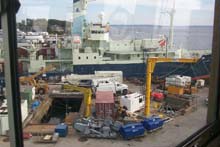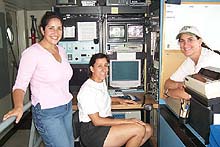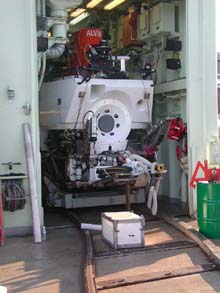
Equipment and supplies rest on the dock to be brought aboard the R/V Atlantis. Click image for larger view.
Voyage of Discovery to Deep Sea Frontiers
September 8, 2001
Diana Payne
The Maritime Aquarium at Norwalk/
Connecticut Sea Grant
My soul is full of longing
For the secret of the Sea,
And the heart of the great ocean
Sends a thrilling pulse through me.
-- Henry Wadsworth Longfellow, The Secret of
the Sea
From Sept. 5-8, the crew of the Woods Hole Oceanographic Institution's (WHOI) research vessel (R/V) Atlantis prepared for a six-month voyage at sea, including one month allotted for the Deep East Voyage of Discovery. Equipment, food, and other items lined the dock waiting to be loaded on board. Scientists, educators, artists, writers, and video specialists began to arrive, loaded with the gear necessary for Leg 1 of the Deep East Expedition.

Educators Rebecca Cerroni, Diana Payne, and Caren Menard at the Alvin submersible's surface controller station aboard the R/V Atlantis. Click image for larger view.
While final shipboard preparations were under way, I hosted several Cape Cod educators at the Woods Hole Exhibit Center for a Deep East Professional Development Institute, highlighting the Deep East Educators' Guide for Grades 5 through 12. Following the workshop, I provided the educators with a tour of the R/V Atlantis and the deep-sea vessel (DSV) Alvin. The teachers are now officially Deep East Educators, and their schools are Deep East Schools of Discovery, joining others from Maine, Connecticut, New York, New Jersey, and South Carolina.
The Educators' Guide was designed to follow the science and exploration of areas of the deep- sea floor that will take place on Legs 1, 2, and 3 of the Deep East Expedition. Leg 1 will investigate deep-sea coral ecology in Oceanographer Canyon, Hydrographer Canyon, Lydonia Canyon, and Bear Seamount, through deep-sea dives in the Alvin manned submersible. The dive schedule, although planned well in advance, may be altered due to the path of Hurricane Erin. In the true spirit of exploration, scientists hope to learn more about the ecology of deep-sea coral species and uncover one of the many secrets of the sea.
Two Teachers' Perspectives: Preparing for Leg 1 of Deep East
Caren Menard, Teacher, WF Kaynor Tech, Waterbury, Connecticut
Karl Stanford, Teacher, Lincoln Academy, Newcastle, Maine
The Deep East Expedition team began to arrive at Woods Hole Oceanographic Institute (WHOI) to prepare for a journey that will take place aboard the R/V Atlantis during the next 23 days. Extensive planning for an expedition like this takes years to ensure that the research plan is carried out in the most effective manner. Equipment, supplies, and food for the next six months were loaded and tied down as final preparations were made for the next day's departure to Georges Bank. Scientists and technicians were busy on deck and in the lab, securing their own equipment and instruments to bench tops. The crew of R/V Atlantis was busy loading crates from the dock. After months of planning, the first leg of NOAA's Deep East Voyage of Discovery was nearly ready to commence.
During the first evening, many details were worked out to prepare for the next day's departure at 12 noon. Even before leaving the dock, we helped with preparations for the Alvin submersible's first dive. Late Saturday night, a screen of 560-micrometer NYTEX mesh was added to one of Alvin's suction samplers to filter out larger microorganisms and particulate matter. According to Dr. Les Watling, expedition chief scientist, NYTEX -- a brand-name plastic netting -- does not break down as quickly in the environment. It lasts longer and does not contaminate the surrounding water. He also noted that the collection buckets must be sealed tightly to ensure a snug, leakless fit, and to ensure proper sampling techniques.
The Alvin was designed as a deep-sea vehicle to allow two observers and a pilot to explore the sea floor during an 8- to 12-hour dive. Alvin can dive to a maximum depth of 4,500 m (approximately 13,500 ft). WHOI engineer Allyn Vine conceived of the submersible, and it is named in his honor. Allyn Vine, however, would have insisted the submersible was named for the cartoon character Alvin from the Chipmunks.
For more information on the R/V Atlantis, WHOI and/or the DSV Alvin, check out the following publications:
Kovacs, D. 2000. Dive to the Deep. Austin, TX: Raintree Steck-Vaughn Publishers.
Kovacs, D. 2000. Off to Sea. Austin, TX: Raintree Steck-Vaughn Publishers.
WHOI Research and Marine Operations
Sign up for the Ocean Explorer E-mail Update List.

































